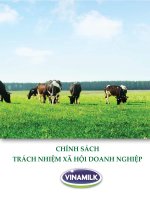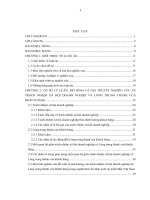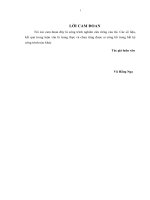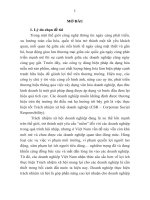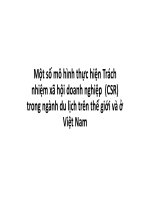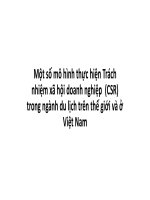CSR Trách nhiệm xã hội của doanh nghiệp Heineken phát triển bền vững
Bạn đang xem bản rút gọn của tài liệu. Xem và tải ngay bản đầy đủ của tài liệu tại đây (386.22 KB, 18 trang )
BỘ GIÁO DỤC VÀ ĐÀO TẠO
TRƯỜNG ĐẠI HỌC MỞ THÀNH PHỐ HỒ CHÍ MINH
SUSTAINABILITY AT HEINEKEN
Journey to zero environmental impact
Instructors
Hoang Thu Thao
Course Name And Number
Corporate Social Responsibilities - MK191C
Student Name
Student ID
Tran Nhut Thanh Thien
1954012322
Nguyen Hoang Minh
1954012180
Nguyen Cong Hieu
1954010059
Pham To Uyen
1954012403
Nguyen Duong Thuan
1954012332
Ho Chi Minh, August 25, 2022
1
Table of Contents
I.
INTRODUCTION...............................................................................................................3
Report Objectives:...........................................................................................................................................................4
II.
HEINEKEN’S ENVIRONMENTAL PROTECTION ACTIVITIES..................................................4
1.
Carbon neutral......................................................................................................................................................4
2.
Circular Economy..................................................................................................................................................6
3.
Water Conservation..............................................................................................................................................9
III.
HEINEKEN’S BENEFITS IN ENVIRONMENTAL PROTECTION ACTIVITIES.........................10
1.
Less waste of materials and energy....................................................................................................................10
2.
Improve customer loyalty...................................................................................................................................13
3.
Corporate image is strengthened.......................................................................................................................13
4.
Increase sale revenue..........................................................................................................................................14
IV.
Conclusion.................................................................................................................16
V.
References.....................................................................................................................16
2
I. INTRODUCTION
The current environmental situation is a concern of the entire community, a global dilemma.
Even this problem is at a seriously alarming level. “During the course of business operations,
businesses that use natural resources sometimes have a negative impact on the air, causing
immediate pollution, water, and soil pollution, making businesses socially responsible for the
environment negative effects appear during its operation. “Under pressure from stakeholders and
the public, many companies resolutely begaaantal issues, as evidenced by increased
communication on social and environmental issues” (Fauziah & Hazanah, 2015). Sustainable
development is “development that meets the needs of the present without compromising the
ability of future generations to meet their own needs.” (Gro Brundtland, 1987). Sustainable
development includes economic growth factors; ensuring social justice; protecting the
environment and respecting human rights. The effects of COVID - 19 have affected many
aspects. In particular, Heineken Vietnam has been affected as all indicators of the economic
contribution of enterprises in Vietnam decrease in 2021 and return to the contribution level of
2017, contributing to a GDP of 0.7% compared to 2017 with 0.94% contribution in 2019 (before
COVID). According to Heineken Vietnam's Sustainability Report 2021, despite many
fluctuations due to the COVID-19 situation, the business still kept its commitments to
stakeholders and the community, and successfully implementing the journey "For a Better
Vietnam” brings many achievements. In 2030, Heineken will continue to strive "For a Better
Vietnam", reach out to "Raise Ambition" and realize the ambitious 2030 sustainable
development goals of Heineken Global. Bringing the message of Sustainable and Responsible
Development will always be the guideline for all decisions of businesses and Heineken Vietnam
will continue to accompany development with the country and people of Vietnam, contributing
to creating a better world for everyone.
Heineken Vietnam has a long history of 30 years with proud marks and achievements. People are
the central factor in Heineken's development journey in Vietnam. Currently, enterprises are
creating 152,000 jobs throughout the value chain, contributing equivalent to 0.7% of the total
national GDP, and are also among the businesses that contribute the most taxes to the state
budget for many consecutive years. With a sustainable and responsible business mission as the
guideline for all activities of Heineken Vietnam, the company is committed to "For a better
3
Vietnam". By the end of 2021, Heineken has completed the goal of “zero waste” landfilling
across all six factories in Vietnam and is now getting closer to the remaining goals. Heineken's
beer products are also brewed with 52% of renewable energy at the factories and reuse or recycle
100% of waste and by-products. In 2021, Heineken Vietnam ranked 2nd in the Top Most
Sustainable Enterprises in Vietnam (manufacturing sector) voted by the Vietnam Chamber of
Commerce and Industry (VCCI). This is the sixth consecutive year the company has Most
Sustainable Enterprises (in the manufacturing sector). Heineken is also a pioneer in responsible
drinking communication activities. In particular, in 2020, Heineken 0.0 was introduced by
Heineken Vietnam in its efforts to accompany the government to promote the awareness that if
you drink alcohol, you should not drive vehicles in Vietnam.
Report Objectives:
Based on the information, the report aims to:
Research and analyze CSR aspects of Heineken businesses in Vietnam.
Evaluate solutions and sustainable development processes of Heineken businesses in Viet
Nam.
II. HEINEKEN’S ENVIRONMENTAL PROTECTION
ACTIVITIES
1. Carbon neutral
Carbon neutrality is an important concept in environmental chemistry. It refers to the reduction
of carbon dioxide emissions to prevent global warming. As you know, global warming leads to
sudden climate changes that can cause different short and long-duration disasters.
Heineken Vietnam believes that climate change is the biggest threat that Vietnam faces in the
coming years. Responding to climate change requires a clear, long-term, multi-stakeholder effort
while remaining feasible. Heineken Vietnam immediately set ambitious goals to contribute to the
response to climate change, as well as join hands to help sustainable development. Heineken
aims to use 100% renewable heat and electricity at all six Heineken breweries across Vietnam.
Currently, 5 out of 6 factories use renewable heat (Heineken Vietnam aims to use 100%
renewable energy, no landfill waste, 2020). The enterprise also aims to return 100% of water to
4
the environment, by committing to return to the environment all the water used for the
production of products (including the amount of water in the product as well as the amount of
water that evaporates during the production process). It is known that since 1993, Heineken
Vietnam has reduced its water consumption by more than 50% and continues to hold the leading
position in water efficiency in the Asia-Pacific region. 100% of wastewater is treated by
Heineken Vietnam to meet safety standards before being returned to the environment. Heineken
Vietnam aims to reuse or recycle 100% of waste or by-products (currently at 99%), without
generating landfill waste. The plan to use biomass energy at the Quang Nam plant was planned
to be implemented in 2020. As soon as it entered the phase of gradual stabilization, with constant
efforts toward the goal of Carbon Neutral, Heineken Vietnam officially cooperated to operate a
biomass boiler at the Quang Nam factory on July 27, 2022. Heineken Vietnam Brewery in
Quang Nam has just completed the goal of using biomass energy to generate heat and brew beer
at all six factories, contributing to realizing the purpose of using 100% renewable energy,
including heat and electricity in production by 2025 of Heineken Vietnam. “Even in challenging
years due to the COVID-19 pandemic, Heineken has continued to implement the goal of 100%
renewable energy in production, and the factory in Quang Nam is the last of the 6. Heineken
Vietnam's factory uses biomass heat in production. The use of biomass energy for thermal
energy needs at Heineken Vietnam's factories not only contributes to increasing the company's
rate of renewable energy use but also contributes to the development of the biomass energy
industry in Vietnam, and generates additional income for local people” (“Heineken Vietnam uses
100% renewable heat to brew beer,” 2022). By the end of 2021, Heineken Vietnam has achieved
the goal of no longer landfilling waste at all six factories and using 52% renewable energy in
production. Biomass is organic material that is burned to produce energy. Biomass energy is
considered renewable energy, in contrast to non-renewable energy - which includes fossil fuels
such as coal or oil and gas, which help reduce carbon emissions into the environment. Switching
to biomass energy for thermal energy demand at the Quang Nam plant contributes to a reduction
of about 1869 tons of CO2e in 2022. The biomass boiler providing heat energy for the Quang
Nam plant has a steam capacity of up to 12 tons/hour, contributing to a 44% reduction in CO2
emissions compared to the heat generated from diesel oil. Currently, it is estimated that each
year, Vietnam generates tens of millions of tons of agricultural by-products including rice straw,
rice husks, sawdust, etc. The use of this biomass energy source not only solves the problem of
5
reducing CO2 emissions into the environment but also contributes to the development of green
energy in Vietnam. With the use of biomass energy at the Quang Nam factory, Heineken
Vietnam will contribute to supporting the use of abundant and stable biomass raw materials
locally and from neighboring areas. There are husks and sawdust from rice mills, sawmills,
carpentry workshops in Quang Nam province, and waste products from sieving at factories
making chips for export in the provinces of Thua Thien - Hue, Da Nang, Quang Nam; and rubber
chips, firewood, and wood chips were collected from wood billet factories in Kon Tum and
Quang Nam. Besides, using biomass energy also helps the company save a lot of money
compared to using thermal energy from diesel oil. Being evaluated as one of the potential
countries in terms of renewable energy in general and biomass reserves in particular, the focus
on developing the biomass industry in Vietnam not only brings value to the environment but also
creates jobs in the locality and neighboring areas, contributing to the economic development of
the country.
2. Circular Economy
At the Vietnam Sustainable Business Forum 2020, Heineken Vietnam shared a circular economy
model that helps make positive economic, social, and environmental contributions throughout
the Enterprise value chain. Heineken Vietnam has set ambitious goals for 2025 in line with its
long-term sustainable development strategy, contributing to long-term development in Vietnam.
At the Plenary Session of the Vietnam Corporate Sustainability Forum (VCSF) 2020, Heineken
Vietnam shared its experience in applying the RESOLVE, circular economy model (short for
REgenerate; Share; Optimize; Loop; Virtualize and Exchange) (Heineken Vietnam: Circular
Economy of Sustainable Value Creation, 2021). It is a comprehensive approach to creating
sustainable value for the environment, including reducing carbon emissions, protecting water
resources, and optimizing resources: Regenerate – 5 out of 6 Heineken Vietnam factories are
currently using renewable thermal energy, with no carbon emissions. Sharing – Sharing
sustainable development experiences for all employees through the Green Office program.
Optimizing – Optimizing payloads, using standard trucks, and taking advantage of rail transport
to reduce CO2 emissions by 2,000 tons. Loop – Heineken Vietnam is now almost free of landfill
waste, thanks to the reuse or recycling of 99% of waste and by-products. Bottles and cases of
beer after being put on the market are all returned to the factory and undergo a strict sterilization
6
process to ensure hygiene standards so that they can be reused. A glass bottle can be reused up to
20 times, and a case of beer can be reused for 5-10 years, after which it will be rolled up and sold
to glass and plastic suppliers. Virtualize – Conduct digital transformation in production and
business activities. Exchange – Switch to installing 100% eco-friendly green refrigerators, using
energy-saving fans, LED lighting, and hydrocarbons, and equipped with an energy management
system. This also helps reduce operating costs for customers.
The circular economy is the key to success and sustainable development for Vietnamese
businesses of any size or business model. This is especially important in the context that Vietnam
is currently one of the countries most affected by climate change, of which devastating
consequences such as storms and floods in the Central region are typical examples. For many
years, the sustainable development strategy "Vì một Việt Nam tốt đẹp hơn" has always been the
core of all production and business activities. Heineken plays a pioneering role in Heineken
Vietnam's efforts in spreading the circular economy model, as well as inspiring the business
community about the value and meaning of sustainable development. For 4 consecutive years
(2016-2019), Heineken Vietnam has always been honored by VCCI as one of the most
Sustainable Manufacturing Enterprises in Vietnam. In 2019, Heineken Vietnam supported the
creation of 212,000 jobs (directly and indirectly) and contributed 0.95% of Vietnam's GDP; in
which almost all packaging materials are supplied domestically, creating an economic value of
nearly VND 5.7 trillion/year (Heineken Vietnam: Circular Economy of Sustainable Value
Creation, 2021). Heineken also kickstarts the digital transformation by analyzing data from a
variety of platforms, helping to better understand and respond to changing needs and consumer
behavior while delivering more value for customers. Heineken Vietnam organized nearly
125,000 hours of training for its employees, continuing its efforts to promote responsible
drinking and contributing to changing driving behavior after drinking in Vietnam. Within the
framework of a long-term strategic partnership with the National Traffic Safety Committee,
Heineken Vietnam has raised the bar for the “Đã uống rượu bia - Không lái xe” campaign in
2019. The company has invested a total of 14 billion VND into creative programs, helping to
convey the message of responsible drinking to more than 56 million people through online
platforms as well as in person at events. In 2019, Heineken Vietnam continues to apply the
circular economy model in production and business activities. The “1 phút tiết kiệm triệu niềm
vui” program is the company's initiative to help communities affected by climate change have
7
access to clean water. By the end of 2019, the program has helped build a total of 25 clean water
works, serving nearly 16,000 households. At the beginning of 2020, joining hands with efforts to
prevent and control the COVID-19 epidemic and relieve the most vulnerable groups from the
pandemic, member companies of the Heineken group around the world and the Heineken family
have contributed a total of 30 million euros, of which Heineken Vietnam (through its Bia Viet
brand), has donated 10 billion VND for epidemic prevention and control in Vietnam (Heineken
Vietnam aims to use 100 renewable energy without landfill waste, 2020).
The current economy is operating based on a linear model, with the product life cycle being
represented in a straight line, from the process of exploitation, production, and consumption to
disposal. At each stage of the linear model, changes can be made towards the transition to a
circular economy model, such as utilizing secondary materials at the extraction stage or
designing products according to easy to collect, sort, and recycle. Applying that thinking,
Heineken has gradually transformed its activities towards a circular orientation. The circular
economy is present at Heineken from production in the factory to operations in the office. The
spirit of circulation is also spread by Heineken to the company's suppliers and distributors.
Specifically, at the factory, beer residues after the production process are used to make animal
feed. Wastewater is also thoroughly treated, which can be used to water plants or raise fish. For
energy used in the plant, Heineken established a third unit to acquire rice husks, and sawdust,
and process them to create biomass fuel. For all kinds of packaging such as cans, bottles, caps
bottles, and a case of beer, Heineken collects directly at shops and supermarkets to recycle and
reuse. Particularly, bottle caps are collected and processed into steel by the company to build
bridges in difficult localities such as Tien Giang and An Giang. At the offices, Heineken's staffs
are also well aware of the mindset of reducing waste and actively recycling through internal
programs such as a contest to decorate a Christmas tree from recycled materials or a program to
promote recycling. The process of exchanging, buying, and selling used goods to collect money
for charity. At events organized by Heineken, attendees are encouraged to use personal water
bottles as an alternative to disposable plastic cups. Event products such as hats and shirts are
wrapped in eco-friendly recycled paper packages instead of plastic bags and plastic bags.
Heineken's programs and activities towards the circular economy model all create "win-win"
benefits, both protecting the environment, helping to reduce production costs, and creating
8
effective communication effects. At the same time, it also contributes to serving and increasing
the livelihoods of the community.
According to the plan, by 2025, Heineken Vietnam will proceed to compensate 100% of the
water used in the production process, use 100% renewable energy, and 100% of waste be
recycled, reused, or properly treated instead of buried and disposed of it in the environment
(Circular Economy: Heineken Vietnam’s ‘Winner’ Model, 2021)
3. Water Conservation
Heineken Vietnam implements water conservation projects in many localities, equipping people
with knowledge and skills to support people to maintain sustainable clean water sources. "With
this project, we support people to access clean water, sponsor waste collection equipment, and
train people in the habit of collecting and classifying waste scientifically. The overall project is
very important to ensure the long-term development of the community." Ms. Holly Bostock Senior External Affairs Director of Heineken Vietnam - shares (Heineken brings water
conservation project to villages, 2020).
The project takes place mainly in rural, mountainous, and remote areas. Starting from January
2020 with typical activities. In January 2020, the water conservation project in Lai Chau was
launched with training sessions, guidance, and technical advice to equip local people with the
necessary knowledge about water scarcity, its causes of water pollution, as well as how to
properly classify and treat waste in agricultural activities and daily life. In fact, in Tam Duong
district, Lai Chau province, so far, many people still do not know how to thoroughly treat
livestock waste or use chemical fertilizers properly and do not have the right tools to collect
agricultural waste. Improper waste disposal and lack of a centralized garbage collection system
have polluted local water sources. Therefore, Heineken Vietnam's water conservation project,
with the support of CISDOMA experts, organized training and guided people on how to use
pesticides appropriately, and at the same time supported the development of pits for collecting
pesticide packaging after use to prevent toxic substances from seeping into the soil and water.
In nearly a year of implementation, the project successfully organized 6 training sessions and 6
technical training sessions, supported some waste collection equipment in Tam Duong, and built
a water pipeline system in Than Uyen. 1,883 households with 8,270 people in 22 villages
benefited through project activities. (Heineken contributes to water conservation in Vietnam,
9
2021). Many of them are ethnic minorities such as Dao, Thai, Lu, and Giay. People have also
learned how to compost, raise earthworms, and properly sort, collect and treat waste.
About Heineken's future goals: Water conservation is one of the key areas on the sustainable
development journey "Vì một Việt Nam tốt đẹp hơn" that Heineken Vietnam commits to. Ms.
Holly Bostock - Senior Director of External Affairs of this company said that the strategic goal
of the company is to ensure that 100% of the water used in the product is reimbursed by 2025.
To achieve this goal, the long-term community clean water program is designed holistically to
address the problem of water scarcity as well as to conserve water resources in Vietnam.
(Heineken contributes to water conservation in Vietnam, 2021)
Through its commitments and results on the journey of water conservation, Heineken Vietnam
has demonstrated its pioneering role in leading sustainable businesses for many years as voted by
VCCI. With the goal of 100% of water being reimbursed, this business is committed to
constantly offering initiatives and actions that significantly contribute to the community to create
positive values for people, the planet, the world, and for a better Vietnam.
III. HEINEKEN’S BENEFITS IN ENVIRONMENTAL
PROTECTION ACTIVITIES
1. Less waste of materials and energy
According to the Queensland Government (2020) magazine, “Avoiding, reducing, reusing and
recycling can lower your costs”. Protecting the environment with renewable energy sources and
putting them into business activities helps businesses save costs and use energy more efficiently.
This will help businesses avoid using raw materials unnecessarily. According to a 2018 report
from The New Climate Economy, “95% of plastic packaging – or $120 billion annually – is
wasted after the first use, and microplastics have been found in 114 aquatic species ” leading to
unnecessary waste in the use of raw materials in production. If the current waste of materials
continues, by 2050 more than 140 million people will have to be displaced from their current
homes due to pollution and waste of resources. Taking action on climate change by adopting
green policies, technologies, and strategies for growth could result in a total of $26 trillion in
economic benefits.
10
Thanks to the use of green technology and sustainable development, Heineken has achieved
many successes in saving materials in production, especially in the efficient use of water. In
2013, Heineken's water consumption for brewing at all breweries in Vietnam was 3.32 hl/hl of
beer. After 8 years of persistently applying advanced water treatment solutions, the amount of
water that Heineken uses for breweries in Vietnam is only 2.65 hl/hl beer. The water efficiency
of 2.65 hl proves that Heineken has succeeded in the water economy cycle, which is much lower
than the industry-wide water efficiency level of 3.04hl. Even 8% of water after participating in
the production process can be used for other activities unrelated to production, helping to save
the maximum amount of water (Heineken Sustainability Report, 2020)
Figure 1 Water consumption at all Heineken breweries in Vietnam
Water consumption per brewery also decreased, with breweries in Vung Tau and Quang Nam
having the most impressive reductions in water consumption of 45% and 34%, respectively, in
the five years from 2016 to 2021.
11
Figure 2 Water Consumption for each Heineken brewery in Vietnam
With the model of maximizing the circular economy according to the model R.E.S.O.L.V.E.
Heineken saves more than 468 million aluminum cans a year. Aluminum cans use 40% recycled
aluminum and are 100% recyclable, closing a cycle.
In 2021, Heineken will recover more than 3,050 tons of liquefied CO2 for industrial use
(equivalent to reducing the circulation of about 663 vehicles on the road each year) using a
carbon-neutral method.
Figure 3 Total energy consumption and carbon emissions of Heineken in Vietnam
12
2. Improve customer loyalty
Since 1991, a report by the Public Opinion QuarterZy has found that “'reported trends have
shown that public concern for environmental quality has reached all-time highs and is growing.
". Also according to Cone Communications' corporate social responsibility research in 2017:
“63% of customers want companies to drive social and environmental change. 87% of
consumers will buy from a company that supports an issue they care about. 76% of customers
expect companies to take action against climate change. 73% of consumers will stop buying
from a company that doesn't care about climate change."
It can be seen that if businesses do not fulfill their social responsibility in environmental
protection, they will gradually lose their loyal customers. – responsible in the eyes of consumers.
From there, connect customers and brands, and convert potential customers into loyal customers.
3. Corporate image is strengthened
Enterprises investing in environmental protection will contribute to creating the trust of society
and consumers in the business itself and its products. Therefore, the image and brand of the
business will be enhanced, and the market for products will be more sustainable. A study
conducted by Andreassen and Lindestad (1998) asserts that “corporate image is the product of
the aggregate process used by customers when they compare and differentiate organizational
attributes”. In a competitive environment, the corporate image has strategic value to the company
and also becomes an important factor supporting the performance and perception of society.
Furthermore, corporate image is considered to have a potential impact on customer loyalty to the
company. According to a survey conducted by Nielsen in the seminar "Brand strategy associated
with green development", 45% of respondents globally are willing to pay more for
environmentally friendly products, and 41% are willing to pay more for eco-friendly packaging.
Vietnamese consumers in the 4.0 era are not out of the above trend. They are more and more
interested in green food, green service, and green business. Green businesses always attract
consumers because of their concern and protection of the environment. In Vietnam, TH True
Milk impresses customers with its pioneering solutions to protect the environment. Through
meaningful environmental protection activities, TH True Milk has been highly appreciated by
customers, creating a green and beautiful brand image in the eyes of customers, in the world,
among the most prestigious companies. In terms of corporate social responsibility, Lego came in
13
3rd place for its decision to produce Legos from plant-based sources. The Danish toy company
plans to use sustainable materials for all its core products and packaging by 2030. As a result, the
company's reputation has skyrocketed.
It can be said that businesses that support the environment are more likely to have a better
corporate image. Very few empirical evaluations show that there is a positive relationship
between green businesses and corporate image. According to research conducted by Abdelzaher
and Newbury (2016) examining whether companies that have green business practices and have
aligned their environmental policies with corporate strategies do indeed have a positive image
and reputation as desired or not. The results of the study show that there is a positive and
meaningful relationship between green policy and corporate image or reputation. If businesses
do not do well in environmental protection, customers, society, and authorities will always have
an unfriendly view of businesses.
More than just beer production and economic development, Heineken Vietnam is recognized for
setting sustainable development standards under the philosophy of "Vì một Việt Nam tốt đẹp
hơn". The company has cut carbon emissions by 50% since 2014, reduced water use by 40%
since 2004, and was one of the first companies in Vietnam to publish a sustainability report.
Currently, Heineken uses 100% renewable energy and aims to have 100% of water recovered by
2025, and no landfill waste. In addition, a Grade A wastewater treatment system is installed to
ensure that all wastewater from the plants is treated by a closed process before being returned to
the environment. From the positive activities, Heineken in the minds of customers is getting
better and better, is an impressive business, a pioneer in environmental protection and
community support. At the same time, when many businesses in general and Heineken in
particular participate in environmental protection categories, it increases the level of brand
recognition and image and creates more and more quality products.
4. Increase sale revenue
"Developing an environment-friendly business brings benefits to businesses, helping businesses
reduce costs and improve production efficiency, thereby increasing sales" is the view of Mr.
Sugianto Tandio - Chairman of PT Tirta Marta Group (Indonesia), he has spent more than 10
years successfully researching and developing environmentally friendly plastic products,
supplying to domestic and international markets. In the context of international economic
14
integration, good environmental protection is one of the conditions and standards for enterprises
to enter the market. Typically, in fields such as organic agriculture, and clean agriculture, there
have been many large enterprises, and business ideas redirecting investment such as TH True
Milk, Vinamilk, VinGroup, and Da Lat Organic Company, ... many Enterprises have invested in
waste collection and treatment systems, participated in supporting programs with the purpose of
environmental protection. In particular, business in the field of environmental supply and
services has begun to become a highly attractive field, many businesses have had many types of
investment and development by organizations and individuals, environment field from many
sources of capital initially formed a system of non-public environmental services, revenue also
increased strongly from here.
Protecting the environment does not mean going against reducing corporate profits or increasing
production costs. These two fields are not always antagonistic to each other but are often
supportive of each other. In developed countries, products with ISO 14000 environmental
certification, although they may be more expensive than similar products, are still preferred by
people because they have a high awareness of environmental protection. The good
implementation of environmental protection is not only the responsibility of enterprises but also
helps businesses improve competitiveness, penetrate markets and ensure sustainable
development. Investment in environmental protection and long-term planning will bring
businesses competitive advantages, differences in production and business activities, and
increase sales. This is a sustainable foundation for many businesses in general and Heineken in
particular to go a long way in competition and increase sales. The green revolution is a potential
opportunity for aspiring businesses. From environmental protection activities, businesses will
attract investors, banks, local authorities and even crowdfunding contributors all want to support
businesses with their sustainable activities to protect the environment. The reason is that an
increasing number of consumers and investors have begun to pay attention to environmental
protection factors. Companies must â able to grow their resources and investments in response to
changing consumer needs. Participating in environmental protection helps businesses increase
profits only when applied seriously and long term. This is the shortest way to help businesses
operate sustainably, increase competitive advantage, increase sales and create a foundation for
economic development at home and abroad.
15
IV. Conclusion
Sustainable development is one of the core important issues for today's society. The importance
of sustainable development - environmental protection in the eyes of consumers is increasingly
focused. Therefore, businesses and corporations like Heineken always need to pay attention to
environmental protection activities to be able to build a close brand image in the eyes of
consumers. Paying attention to the environment also helps businesses like Heineken save costs in
production and sustainably incâ. Heineken has been doing very well in the process of sustainable
development in the Vietnamese market in particular and the world in general. Heineken's
achievements in environmental protection are evidenced by major domestic awards such as the
title of a sustainable development company in 2020 in Vietnam. The figures through Heineken's
sustainability report in 2021 also clearly and specifically demonstrate that Heineken's indicators
of fuel consumption, water waste, and environmental pollution are decreasing significantly. .
Continuing to build a green brand image will help Heineken grow strongly in the future the
Vietnamese market and connect the Dutch beer brand with consumers, producers and employees
through the sustainable development journey.
V. References
1. Heineken. (2021). Sustainability Report, from />2. Brundtland, G. (1987). Our Common Future—Call for Action. Environmental
Conservation, 14(4), 291-294. doi:10.1017/S0376892900016805
3. Fauziah & Hazanah. (2015). The Influence of Company Characteristics toward
Corporate Social Responsibility Disclosure. Diploma thesis, Universitas Andalas, from
/>4. TM. (2022, August 15). Heineken Vietnam uses 100% renewable heat to brew beer. Bao
Moi, from: />5. Trong Van. (2020, June 16). Heineken Vietnam aims to use 100% renewable energy,
with no landfill waste. Nguoi Do Thi, from: />16
6. Heineken Vietnam. (2021). Circular Economy of Sustainable Value Creation, from:
/>7. Minh Anh. (2021). Heineken contributes to water conservation in Vietnam. VN Express,
from: />8. Ai Diep, Minh Tu. (2020, December 07). Heineken brings water conservation projects to
villages. Tuoi Tre Online, from: />9. Queenlands Government. (2020). The benefits of an environmentally friendly business,
from />10. NCE. (2018). Unlocking The Inclusive Growth Story Of The 21st Century: Accelerating
Climate Action In Urgent Times, from ort/2018/
11. Cone Communication. (2017). 2017 Cone Communications CSR Study, from
/>12. Dunlap, R.E. and Scarce, R. (1991). Environmental problems and protection, Public
Opinion Quarterly, 55 (Winter), 651-672
13. Heineken. (2021). Sustainability Report, from />14. Tran Thi Hong Ngoc, Phan Truong Khang, Duong Hoang Thuong. (2020, June 12).
Corporate benefits and environmental responsibility. Industry And Trade Magazine,
from />15. Nguyen The Chinh, Lai Van Manh. (2021, October 29). Enterprises protect the
environment with green growth and sustainable development. Natural Resources And
Environment, from />
17
16. Marane A. Plaza. (2018, July 20). Benefits of Having an Eco-Friendly Business. Business
Mirror, from />17. Mohamad Nur Utomo, Widyastuti Cahyaningrum, Kaujan. (2019). Does Green Business
Improve Corporate Image And Firm Value? International Journal Of Scientific &
Technology Research, 8(12), 3106–3114.
18. D. Abdelzaher and W. Newburry/ (2016) Do green policies build green reputations?.
Journal of Global Responsibility, vol. 7, pp. 1-36.
19. T. W. Andreassen and B. Lindestad. (1998) The impact of corporate image on quality,
customer satisfaction, and loyalty for customers with varying degrees of service
expertise. International Journal of Service Industry Management, vol. 9, pp. 7-23.
20. Nielsen. (2018). Global Sustainable Shoppers Report 2018, from
/>
18



